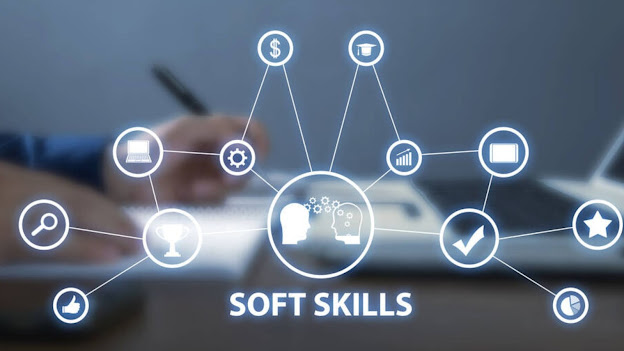What Are Soft Skills? Definition, Importance, and Examples
In the dynamic landscape of modern workplaces, the importance of soft skills has emerged as a defining factor for individual and organizational success. Often overshadowed by technical prowess, soft skills play a pivotal role in fostering effective communication, collaboration, and overall professional development. In this comprehensive guide, we will delve into the definition, and importance, and provide examples of soft skills to unravel their significance in the contemporary world of work.
Definition of Soft Skills:
Soft skills, also known as interpersonal or people skills, refer to a set of attributes and personal qualities that enhance an individual's interactions, job performance, and career prospects. Unlike hard or technical skills, which are specific and measurable abilities acquired through education or training, soft skills encompass a more intangible set of qualities that contribute to a person's overall effectiveness in the workplace.
Introducing Vati, an innovative career planning and assessment platform dedicated to elevating your soft skills. In the realm of personal and professional development, Vati stands out as an innovative tool, offering personalized insights and guidance to hone essential interpersonal qualities. Explore a new dimension of growth with Vati and unlock your full potential.
Key Soft Skills:
1. Communication Skills:
- Definition: The ability to convey information clearly and effectively through verbal, non-verbal, and written means.
- Importance: Facilitates smooth collaboration, minimizes misunderstandings, and strengthens relationships within and outside the organization.
- Examples: Active listening, articulate expression, and adeptness in written communication.
- Definition: The capacity to work harmoniously with others towards a common goal, contributing positively to group dynamics.
- Importance: Fosters a collaborative work environment, enhances creativity, and boosts overall team productivity.
- Examples: Cooperation, conflict resolution, and the ability to share credit and recognition.
- Definition: The willingness and ability to adapt to changing circumstances and embrace new ideas or ways of working.
- Importance: Crucial in navigating dynamic work environments, driving innovation, and staying resilient in the face of challenges.
- Examples: Openness to change, agility, and a proactive approach to learning new skills.
- Definition: The capacity to analyze situations, identify challenges, and develop effective solutions.
- Importance: Critical for overcoming obstacles, driving efficiency, and contributing to continuous improvement within an organization.
- Examples: Critical thinking, creativity, and strategic decision-making.
- Definition: The ability to guide, motivate, and inspire others to achieve common goals.
- Importance: Essential for driving organizational success, fostering a positive workplace culture, and cultivating future leaders.
- Examples: Delegation, empathy, and the ability to provide constructive feedback.
6. Time Management:
- Definition: Efficiently organizing and prioritizing tasks to optimize productivity and meet deadlines.
- Importance: Enhances individual and team efficiency, reduces stress, and ensures timely completion of projects.
- Examples: Prioritization, goal setting, and effective delegation.
7. Emotional Intelligence:
- Definition: The capacity to understand, manage, and express one's emotions, as well as empathize with others.
- Importance: Facilitates effective communication, builds positive relationships, and contributes to a healthy work environment.
- Examples: Self-awareness, empathy, and skilled conflict resolution.
- Definition: The ability to build and maintain professional relationships that can contribute to personal and career growth.
- Importance: Opens avenues for opportunities, career advancement, and access to valuable resources.
- Examples: Building rapport, effective communication in social settings, and maintaining a professional online presence.
Importance of Soft Skills:
1. Enhanced Communication:
Examples of Soft Skills in Action:
Scenario 1: Teamwork and Collaboration
- Example: In a team project, a team member actively listens to diverse opinions, facilitates open communication, and ensures that every team member feels heard and valued. This fosters a collaborative atmosphere, leading to a successful project outcome.
Scenario 2: Adaptability and Flexibility
- Example: During a company-wide software upgrade, an employee demonstrates adaptability by proactively learning the new system, assisting colleagues, and efficiently adjusting to the changes. This showcases resilience in the face of technological shifts.
Scenario 3: Leadership Skills
- Example: A team leader exhibits effective leadership by delegating tasks according to team members' strengths, providing constructive feedback, and fostering a supportive environment. This approach motivates the team and enhances overall productivity.
Scenario 4: Emotional Intelligence
- Example: In a high-pressure situation, an employee demonstrates emotional intelligence by remaining composed, understanding the emotions of colleagues, and navigating the challenge with empathy. This contributes to a positive work atmosphere even in stressful circumstances.
Scenario 5: Networking Skills
- Example: Attending a professional networking event, an individual engages in meaningful conversations, builds rapport with industry professionals, and follows up with personalized emails. This establishes a valuable network for future career opportunities.
Conclusion:
In conclusion, soft skills are the bedrock of personal and professional success in the contemporary workplace. As a reputed career development and assessment platform, we understand organizations these days, increasingly recognize the importance of holistic skill sets, and individuals must prioritize the development and refinement of soft skills alongside technical expertise. Whether aiming for career advancement, effective collaboration, or personal growth, mastering the art of soft skills opens doors to a myriad of opportunities in the ever-evolving landscape of work.
Read More Articles:
- What Is Microlearning: Definition, Types, Benefits & Drawbacks
- 5 Tips — How To Write A Resume With No Experience
- Exploring Educational Opportunities: Top 10 Countries Offering Free Education
- Navigating The Skills Gap: A Comprehensive Exploration Of Skills & Reskilling
.jpg)



Comments
Post a Comment